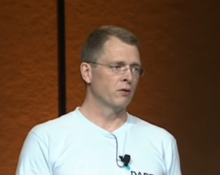Lars Bak (computer programmer)
In this article, we will explore the topic of Lars Bak (computer programmer) in depth, analyzing its origins, its relevance today, and its impact in various areas. Since its appearance, Lars Bak (computer programmer) has aroused great interest and has been the subject of numerous debates and studies. Over the years, Lars Bak (computer programmer) has evolved and adapted to the changes of the modern world, acquiring new dimensions and meanings. Through this article, we will delve into the most relevant aspects of Lars Bak (computer programmer), offering a complete and updated vision that allows the reader to thoroughly understand this phenomenon and its implications in today's society.
Lars Bak | |
|---|---|
 Computer programmer | |
| Born | 1965 |
| Nationality | Danish |
| Occupation | Computer programmer |
| Known for | JavaScript expert and work on virtual machines |
Lars Bak (born 1965) is a Danish computer programmer. He is known as a JavaScript expert and for his work on virtual machines. He previously worked for Google, having contributed to the Chrome browser as the lead developer of the V8 JavaScript engine.
Professional life
Bak studied at Aarhus University in Denmark, receiving an MS degree in computer science in 1988 after which he became active in designing and implementing object-oriented virtual machines. He has been awarded the 2018 Senior Dahl–Nygaard Prize.
Virtual machines
After participating in the design and implementation of the BETA Mjølner System, in 1991 he joined the Self group at Sun Microsystems Laboratories in Palo Alto, California. During his time there, he developed a programming environment for Self and added several enhancements to the virtual machine.
In 1994, he joined LongView Technologies LLC, where he designed and implemented high performance virtual machines for both Smalltalk and Java. After Sun Microsystems acquired LongView in 1997, Bak became engineering manager and technical lead in the HotSpot team at Sun's Java Software Division where he developed a high-performance Java virtual machine.
In 2002, after returning to Aarhus, Denmark, Bak founded OOVM, a company which developed software for mobile phones. In 2004, he sold it to a Swiss company, Esmertec.
In 2004, Bak joined Google to work on the Chrome browser. He did not return to the United States, preferring to work in Denmark where his daughters were also receiving their education. With a team of 12 engineers, Bak coordinated the development of the V8 JavaScript interpreter for Chrome, named after the V8 engine.
Bak co-developed the Dart programming language presented at the 2011 Goto conference in Aarhus, Denmark.
In 2017, Bak left Google and soon afterward co-founded[dubious ] a startup with Kasper Lund called Toit, which is building a new programming language called Toit and a platform for Internet of Things systems.
Patents
Bak holds 18 U.S. software patents in the field of virtual machines programming. In 2010, after Oracle bought Sun and with Lars Bak working for Google, Oracle sued Google for infringing on several software patents and amongst them was the "Interpreting Functions Utilizing a Hybrid of Virtual and Native Machine Instructions" patent filed by Lars Bak et al.
References
- ^ a b c Schenker, Jennifer L. (November 12, 2008). "Google's Chrome: The Danish Magic Inside". Businessweek. Archived from the original on October 21, 2012. Retrieved 6 December 2013.
- ^ "The AITO Dahl-Nygaard Prize Winners for 2018". Association Internationale pour les Technologies Objets. Retrieved 7 January 2018.
- ^ Lars Bak, Biography, from JAOO.dk. Retrieved 29 March 2009.
- ^ Guest Lecture by Lars Bak: A NEW APPROACH TO DEVELOPING ROBUST EMBEDDED SOFTWARE. Tampere University of Technology. Retrieved 29 March 2009.
- ^ The genius behind Google’s web browser. From FT.com. Retrieved 29 March 2009.
- ^ "V8: an open source JavaScript engine". YouTube. Google. Retrieved 15 March 2024.
- ^ "Presentations -> Opening Keynote: Dart, a new programming language for structured web programming". Gotocon.com. Retrieved 2013-10-08.
- ^ "Aarhus-eksperter fra Chromes Javascript-motor skaber IoT-sprog og virtuel maskine". Version2 (in Danish). 3 July 2018. Retrieved 27 July 2018.
- ^ Lund, Kasper (24 Feb 2019). "Leaving Google for a couple of devices". Toit Blog. Retrieved 25 Jun 2021.
- ^ Google's Chrome: The Danish Magic Inside. BusinessWeek. Retrieved 29 March 2009.
- ^ "Patent US6910205 - Interpreting functions utilizing a hybrid of virtual and native machine instructions". Google Patents. Retrieved 15 April 2020.